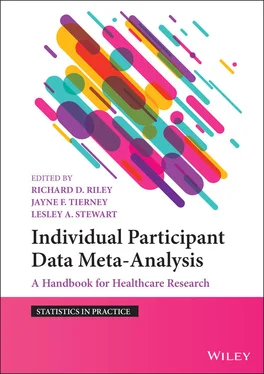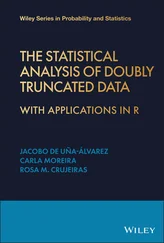Individual Participant Data Meta-Analysis
Здесь есть возможность читать онлайн «Individual Participant Data Meta-Analysis» — ознакомительный отрывок электронной книги совершенно бесплатно, а после прочтения отрывка купить полную версию. В некоторых случаях можно слушать аудио, скачать через торрент в формате fb2 и присутствует краткое содержание. Жанр: unrecognised, на английском языке. Описание произведения, (предисловие) а так же отзывы посетителей доступны на портале библиотеки ЛибКат.
- Название:Individual Participant Data Meta-Analysis
- Автор:
- Жанр:
- Год:неизвестен
- ISBN:нет данных
- Рейтинг книги:5 / 5. Голосов: 1
-
Избранное:Добавить в избранное
- Отзывы:
-
Ваша оценка:
Individual Participant Data Meta-Analysis: краткое содержание, описание и аннотация
Предлагаем к чтению аннотацию, описание, краткое содержание или предисловие (зависит от того, что написал сам автор книги «Individual Participant Data Meta-Analysis»). Если вы не нашли необходимую информацию о книге — напишите в комментариях, мы постараемся отыскать её.
Intended for a broad audience, the book will enable the reader to:
Understand the advantages of the IPD approach and decide when it is needed over a conventional systematic review Recognise the scope, resources and challenges of IPD meta-analysis projects Appreciate the importance of a multi-disciplinary project team and close collaboration with the original study investigators Understand how to obtain, check, manage and harmonise IPD from multiple studies Examine risk of bias (quality) of IPD and minimise potential biases throughout the project Understand fundamental statistical methods for IPD meta-analysis, including two-stage and one-stage approaches (and their differences), and statistical software to implement them Clearly report and disseminate IPD meta-analyses to inform policy, practice and future research Critically appraise existing IPD meta-analysis projects Address specialist topics such as effect modification, multiple correlated outcomes, multiple treatment comparisons, non-linear relationships, test accuracy at multiple thresholds, multiple imputation, and developing and validating clinical prediction models Detailed examples and case studies are provided throughout.












